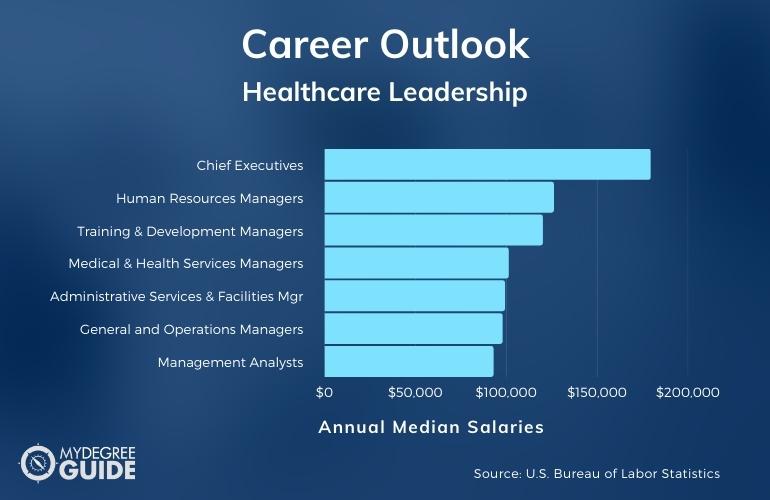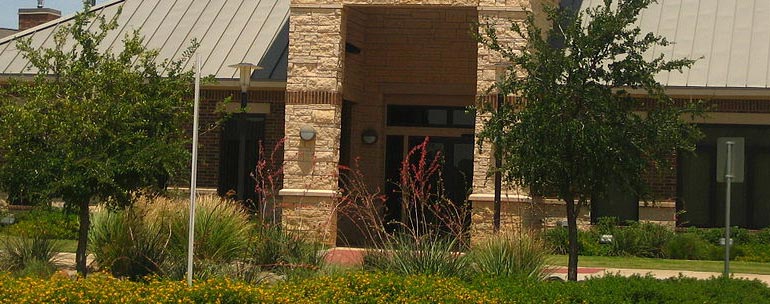A healthcare leadership degree may be a strategic bachelors program for you to pursue if you are interested in a leadership role in a healthcare environment.

You may also consider this degree if you’re interested in the regulation and policy that shapes our healthcare system. In addition, this path is beneficial for those who desire to recruit, train, and manage others in a healthcare organization.
Editorial Listing ShortCode:
With healthcare careers on the rise, graduates may find numerous job opportunities available in a broad number of industries.
Online Healthcare Leadership Degrees

Pursuing an online healthcare leadership degree can help you develop the communication, business, and management skills needed to be an effective leader in a healthcare setting.
Graduates can find career opportunities available in public and private sectors as well as government institutions at both the federal and state levels. As you prepare for a leadership career in healthcare, this program will help you understand the regulations, policies, ethics, and political factors that affect how healthcare organizations run.
Editorial Listing ShortCode:
You can also gain an understanding of the US healthcare system and how it compares to other healthcare systems globally. Healthcare is a dynamic environment, including innovative technologies, systems, and healthcare reform that can bring unique opportunities and challenges.
Healthcare organizations need leaders who are critical thinkers and who can adapt and provide solutions to these unique challenges.
In your program, you may focus on the theoretical and practical application of skills in the following areas:
- Leadership and management
- Healthcare law and ethics
- Knowledge of the healthcare environment
- Business skills and knowledge
- Finances and resources
- Communication and relationship management
- Training and marketing
Courses you may take as part of your program can include topics on effective communication, human resources, healthcare data analysis, team development, and quality improvement. There are a variety of healthcare settings that need individuals with the necessary leadership skills to manage their organizations.
These healthcare settings include hospitals, outpatient clinics, nursing homes, medical group practices, and physical therapy centers, to name a few. There are also opportunities in government and local health agencies, including roles like consumer safety inspector, health planning analyst, and community health specialist.
Healthcare Leadership Careers & Salaries

Upon completing your bachelors in healthcare leadership degree, you may find various career paths that allow you to assume a leadership role in a healthcare setting.
Hospitals, outpatient clinics, nursing homes, physicians’ offices, dentist offices, and rehabilitation centers are just a few examples of these healthcare settings. Some roles may require a certain level of experience. So, graduates may first take on entry-level roles in order to work their way toward a management or leadership position.
According to the Bureau of Labor Statistics, listed below are some careers related to the field of healthcare leadership.
| Careers | Annual Median Salaries |
| Chief Executives | $179,520 |
| Human Resources Managers | $126,230 |
| Training and Development Managers | $120,130 |
| Medical and Health Services Managers | $101,340 |
| Administrative Services and Facilities Managers | $99,290 |
| General and Operations Managers | $97,970 |
| Management Analysts | $93,000 |
| Social and Community Service Managers | $74,000 |
| Training and Development Specialists | $61,570 |
| Health Education Specialists and Community Health Workers | $48,860 |
The need for health services managers and leaders is on the rise, with many roles paying higher than average salaries. In fact, the Bureau of Labor Statistics projects 28% job growth for medical and health services managers over the next ten years, which is much faster than the average rate.
Editorial Listing ShortCode:
Roles in healthcare settings can include clinical coordinators, health planning analysts, medical record administrators, patient care administrators, and immunization specialists.
Healthcare Leadership Bachelor’s Curriculum & Courses

While healthcare leadership major courses vary, here are some of the fundamental courses you may take to complete your degree:
- Team Development in Healthcare: This course teaches the basics of team behavior, including conflict management, team dynamics, decision-making, and communication.
- Critical Thinking in Healthcare: In this course, you’ll learn strategic processes for improving critical thinking to solve problems in healthcare leadership roles.
- Management of Human Resources: This course introduces you to HR practices, such as recruiting, training, performance management, and safety and health.
- Ethics and Law in Healthcare: This course focuses on current legal and ethical issues in healthcare, healthcare reform, and individual political and moral conflicts that can occur.
- Quality Improvement in Healthcare: In this course, you’ll learn methods for measuring quality and develop processes for ensuring quality improvement in healthcare settings.
- Healthcare Operations: This course focuses on the internal operations of healthcare organizations, including policy and regulations, risk management, internal communications, and more.
- Professional Communication Skills: This course teaches effective communication skills needed as a leader, including presentation and presentation technology skills.
- Healthcare Information Systems: In this course, you’ll learn the basics of healthcare information systems and technologies, with a focus on application and implementation.
- Statistical Thinking for Healthcare: This course applies statistical methods to health sciences, with an emphasis on understanding statistics in health science research.
- Overview of the Healthcare System: This course introduces you to the evolution of the healthcare system, current trends, and the relationship between cost, access, and quality of patient care.
In addition to these healthcare-leader courses, you may be required to take general education courses to complete your bachelors degree.
Admissions Requirements

While schools’ admissions requirements can vary, here are some common admissions criteria for pursuing a bachelors in healthcare leadership degree:
- High school or GED transcript. Most schools will require your high school transcript or GED transcript, if applicable.
- Minimum GPA. Some schools require a minimum GPA from high school or transferable courses from another postsecondary institution.
- Application and fee. Most programs require an online application and fee payment as part of the application process.
In addition to the above criteria, some schools may require or encourage the submission of SAT or ACT scores. A growing number of schools, though, no longer require standardized test scores for college admission.
Accreditation

Regional accreditation is the process of ensuring a school and its program offerings meet a predetermined standard of quality.
Regional accreditation is the most widely accepted type of accreditation, and it can affect your opportunities both before and after you complete your degree. Many schools will only accept transfer credits from other regionally accredited institutions.
Editorial Listing ShortCode:
In addition, some masters and doctoral programs, such as an on-campus or online doctorate in healthcare management, only recognize bachelors degrees that were earned at regionally accredited schools. Accreditation can also be an eligibility requirement for financial aid and various job opportunities. For additional school accreditation information, you can visit the US Department of Education’s website.
Financial Aid and Scholarships

As you research various bachelor degree programs, you can also look into the various financial assistance opportunities that may be available to you.
Both federal and state governments provide student loans and grants to qualifying students. While loans need to be repaid, grants do not. You could also look into scholarship opportunities offered through public, private, and educational institutions.
If you’re currently employed in a healthcare setting, you may look into whether your employer offers tuition assistance or reimbursement with any cooperating educational institutions. To learn more about the potential financial assistance opportunities available, you can visit the Federal Student Aid website.
What Is a Healthcare Leadership Degree?

A healthcare leadership degree is a bachelor program that prepares graduates for the unique responsibilities and challenges that leaders face in healthcare settings.
Healthcare leadership programs help you develop communication, relationship management, professionalism, business, finance, and leadership skills. Your studies particularly emphasize the application of these skills in healthcare settings.
Courses in this program also help students develop critical thinking skills that enable them to identify and solve problems in their organization, including in areas like human resources and patient care. The business and finance skills graduates may gain could also be used to analyze and manage a health organization’s finances, including budgeting, payroll, compensation, and benefits.
What Can You Do with a Bachelors in Health Care Leadership Degree?

As a healthcare leadership major, you may pursue a number of administrative and leadership roles in healthcare environments.
Every healthcare setting—from hospitals to rehabilitation centers and outpatient clinics—needs individuals with the necessary skills to manage and run an organization effectively. You can pursue opportunities in insurance, pharmaceuticals, and government agencies at both the federal and state levels.
Many graduates pursue health services management positions, though these roles might require prior work experience in an administrative or support role. Those with a healthcare leadership degree are also well-positioned to pursue masters and doctoral degrees in healthcare-related fields.
How Long Does It Take to Get an Online Bachelors Degree in Healthcare Leadership?

The time it takes to complete your bachelors in healthcare leadership degree will depend on your program’s academic schedule and whether you attend full-time or part-time. For instance, if you follow a traditional 16 week semester and attend full-time, it will generally take 4 years to complete your bachelors degree.
Editorial Listing ShortCode:
If you follow an 8 week semester and stay enrolled year-round, including during the summer, you may be able to finish in less time. If you enroll part-time, it will likely take longer for you to complete your degree.
What’s the Difference Between a Bachelors in Healthcare Management vs. Leadership Degree?

While both a bachelor in healthcare management and a bachelor in healthcare leadership can prepare you for administrative or leadership roles in healthcare organizations, there are some differences.
The focus of a bachelors in healthcare leadership is on:
- Communication and team leadership
- Critical thinking and problem-solving
- Human resources
- Quality improvement
The focus of a bachelors in healthcare management is on:
- Business and finances
- Management and daily operations
- Healthcare law and ethics
- Compliance and regulations
The degree path that’s right for you will likely depend on your personal interests and professional goals.
Is a Bachelor Degree in Healthcare Leadership Worth It?

Yes, a bachelor degree in healthcare leadership is worth it for many students. If you desire to improve healthcare organizations and positively affect patient care, staff development, internal operations, and policies, you might want to consider this degree path.
Editorial Listing ShortCode:
There is a growing need for leaders in healthcare, and there are job opportunities available in numerous industries that tend to pay higher-than-average salaries. According to the Bureau of Labor Statistics, employment for medical and health services managers is expected to grow 28% over the next ten years.
Universities Offering Online Bachelors in Healthcare Leadership Degree Programs
Methodology: The following school list is in alphabetical order. To be included, a college or university must be regionally accredited and offer degree programs online or in a hybrid format.

Bethel University offers a Bachelor of Science in Business Leadership with a concentration in Healthcare Management. The curriculum consists of courses such as Computer Information Systems, Principles of Managerial Accounting, Survey of Marketing, and Understanding the Economics of Business.
Bethel University is accredited by the Southern Association of Colleges and Schools Commission on Colleges.

Carlow University offers a program for a BS in Healthcare Management. It uses a flexible online format while still providing internship opportunities and hands-on learning experiences. The curriculum consists of courses such as Intro to Management in Health Services, Human Resource Management, and Principles of Marketing. Students begin taking courses for their major in the very first semester.
Carlow University is accredited by the Middle States Commission on Higher Education.

Eastern International College offers a Bachelor of Science in Health Leadership degree completion program. It is intended for those who already have an associate degree in a health-related field. The program is designed to allow students to earn the degree while working full-time and maintaining prior commitments.
Eastern International College is accredited by the Middle States Commission on Higher Education.

Franklin University offers a BS in Healthcare Management. The degree can be completed 100% online, and classes are 6 or 12 weeks long. The program is highly customizable through a wide range of elective options. The curriculum emphasizes practical applications, and classes are taught by instructors with real-world experience working in healthcare.
Franklin University is accredited by the Higher Learning Commission.

Illinois College offers an online program for a Bachelor of Arts in Healthcare Management. The program includes asynchronous, 8 week courses and an internship to help students gain real-world experience. The curriculum consists of courses such as Principles of Economics, Principles of Accounting, Computer Information Systems, and Healthcare Finance.
Illinois College is accredited by the Higher Learning Commission.

At James Madison University, students can earn a Bachelor of Individualized Study, a Bachelor of Arts in Individualized Study, or a Bachelor of Science in Individualized Study. Each of these programs offers a track in Healthcare Leadership. These degree completion programs are designed for working adults and have course options available online and on campus.
James Madison University is accredited by the Southern Association of Colleges and Schools Commission on Colleges.

Maryville University’s BS in Healthcare Management can be earned 100% online. To graduate, students must complete a hands-on practicum. The program also offers the option to earn a Certificate in Senior Living Management along with the degree. The curriculum consists of courses such as Software and Technology in Healthcare, Medical Law and Risk Management, and Business Operations.
Maryville University is accredited by the Higher Learning Commission.

Mercer University offers a BS in Healthcare Leadership. The program is designed for working adults. It offers 8 week courses that are available online and on campus in the evenings. Students may choose specializations in Health Informatics, Communication, Human Resources, Organizational Leadership, Public Safety, or Human Services.
Mercer University is accredited by the Southern Association of Colleges and Schools Commission on Colleges.

Nebraska Methodist College offers a BS in Healthcare Management. The program is primarily online, but some courses are available on campus. The curriculum consists of courses such as Research Methods, Healthcare Economics, and Principles of Financial Accounting. Applications are accepted on a rolling basis for fall, spring, and summer semesters.
Nebraska Methodist College is accredited by the Higher Learning Commission.

Trine University offers an online program for a Bachelor of Science in Healthcare Administration. Courses are asynchronous, and each one is 8 weeks long. The curriculum consists of courses such as US and World Healthcare Systems, Applied Finance and Revenue Cycle, and Technology and Clinical Systems.
Trine University is accredited by the Higher Learning Commission.

The University of Cincinnati offers an online program for a Bachelor of Technical and Applied Studies in Healthcare Leadership. This is a 2+2 program designed for students who already have an associate degree. UC’s online classes seek to provide students with both personalized attention and flexible scheduling options.
The University of Cincinnati is accredited by the Higher Learning Commission.

The University of Louisville offers an online program for a Bachelor of Science in Organizational Leadership and Learning with a track in Healthcare Leadership. The program is designed for those who already have work experience in healthcare. Students may be able to earn credits based on a Prior Learning Assessment.
The University of Louisville is accredited by the Southern Association of Colleges and Schools Commission on Colleges.

The University of Memphis offers a fully online program for a Bachelor of Science in Healthcare Leadership. It emphasizes experiential learning and provides multiple internship opportunities. The curriculum consists of courses like Healthcare Statistics and Research, Business Principles of Healthcare, and Healthcare Informatics and Technology.
The University of Memphis is accredited by the Commission on Colleges of the Southern Association of Colleges and Schools.

The University of Texas Permian Basin offers a Bachelor of Applied Arts and Sciences in Healthcare Leadership. This flexible online program is designed for working professionals who already have an associate degree. The curriculum consists of courses such as Quantitative Decision Tools, Occupational Health and Safety Concepts, and Project Management. Each course is 8 weeks long.
UTPB is accredited by the Southern Association of Colleges and Schools Commission on Colleges.

Winona State University offers an online bachelor’s degree completion program in healthcare leadership. Courses are asynchronous and teach from a holistic view of the healthcare industry.
Students in the program are given opportunities to participate in hands-on projects and receive personalized advising. The school also offers an accelerated program that allows students to start working on their master’s degree before they graduate.
Winona State University is accredited by the Higher Learning Commission.
Getting Your Bachelor’s Degree in Healthcare Leadership Online

Online bachelors degrees in healthcare leadership can help you develop the skills and knowledge necessary for leadership roles in the healthcare industry.
You may choose to work directly in a healthcare environment, such as a hospital or clinic, or you may pursue opportunities with the state or federal government. Opportunities with an online degree in healthcare management also exist in private sectors, including insurance, pharmaceuticals, and medical supply chains.
Some graduates want to be in a position to recruit, hire, and train others, aiming to develop and manage staff that works together cohesively as a team. You can look into online healthcare leadership degrees from accredited schools to see which programs best match your interests and career goals.

